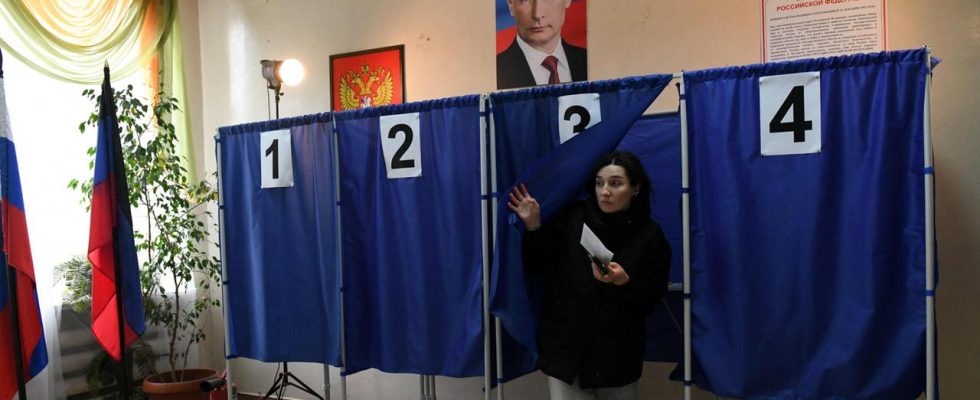Protest with paint and fire in polling stations: Opponents of Russian President Putin have tried to disrupt his re-election with small actions. The authorities report that more than half of the people have voted so far.
Voting for the re-election of Russian President Vladimir Putin runs over three days – by the afternoon of the second day, according to the electoral commission, more than every second eligible voter had already cast their vote. Overall, the election went smoothly, according to the authorities. Participation is an important value for the Kremlin to counter doubts about how much active support for Putin and his war of aggression actually is.
However, independent observers point to systematic fraud in the election. For example, employees of state-owned companies are reportedly being pushed to the polls in large numbers. According to independent media, hundreds of companies have already published group photos of their employees in front of each polling station on social networks. Videos also showed people being taken to voting locations in buses.
A video that the Russian election monitoring group Golos published on social networks also raised questions. It appeared to show employees at a polling station in the southern city of Krasnodar stuffing several ballots into ballot boxes. There were also reports of great pressure on Ukrainian people who were supposed to take part in the illegal vote in the occupied territories in the attacked country.
Protest actions with color and fire
The vote, which is intended to secure Putin a fifth term in office, continues until Sunday evening at 7 p.m. CET. The 71-year-old Kremlin chief has no real opposing candidates. Serious opposition figures have either not been accepted as candidates, have fled abroad or are in prison camps. Kremlin opponents are therefore calling for protests.
On the first day of voting on Friday, men and women at various polling stations poured paint into ballot boxes to invalidate the ballot papers inside. In some cases they started smaller fires. Several people were arrested. On Saturday, a woman in Yekaterinburg in the Urals was stopped by police from trying to pour green liquid into a ballot box. Such an incident is also reported in Kaliningrad.
The green substance used is similar to the antiseptic Seljonka, which has been used several times in the past in attacks by actors loyal to the Kremlin on political opponents – including Alexei Navalny, who died in a penal colony in February under unclear circumstances.
Appointment for Sunday, 12 p.m
However, the main protest is planned for Sunday: various opposition members are calling on Russians to show up at the polling stations at exactly 12 p.m. It is hoped that the long queues will reflect the dissatisfaction in the country. It is feared that arrests will be made again.
The authorities have already warned against taking part in the action, claiming that they saw “signs of extremist activity” in it. Threatening text messages to Kremlin critics were reported from the capital Moscow. The independent portal Meduza, among others, published screenshots of a collective message that said: “Regardless of the fact that you support the ideas of extremist organizations, we are pleased that you will vote in Moscow.” This is followed by a request to take part in the election “quietly” – “without queues and provocations”. It is not known who is behind the messages sent on Telegram and Signal and how the recipients were selected.
In total, Moscow is calling on 114 million people to take part in the vote, which has been criticized as undemocratic – more than 4.5 million of them in the occupied parts of the Ukrainian regions of Donetsk, Luhansk, Zaporizhia and Kherson. Votes are also being organized on the Black Sea peninsula of Crimea, which Moscow annexed in 2014. Kremlin opponents are calling on the international community not to recognize the result.
Elections in Russia
The presidential election process implemented in Russia between March 15 and 17, in which Vladimir Putin wants to achieve a fifth term in office, does not meet democratic standards. The three candidates admitted alongside Putin, Nikolai Kharitonov (Communist Party), Leonid Slutsky (right-wing populist LDPR) and Vladislav Dawankov (Vice-Chairman of the Duma, candidate of the economically liberal “New People”) are part of the system opposition, real opponents of the Kremlin and the war of aggression against it Ukraine were not accepted as candidates.
Voting will also take place in the occupied territories of Ukraine – under questionable circumstances.
There had hardly been an actual election campaign in advance, but there were reports from independent journalists about pressure on civil servants and employees of state-owned companies to register to vote and to bring at least ten people with them.
There are high hurdles for independent election observers, for example the “Golos” organization was branded as a “foreign agent” several times and disbanded. Those announced from abroad are primarily representatives from states that have strong sympathies for the Russian leadership, such as Serbia, or are themselves governed in an autocratic to dictatorial manner (Venezuela, Myanmar, Cameroon). Three AfD MPs want to travel from Germany as “experts on democracy”.
In previous elections in Russia, there had always been reports and videos of evidence of manipulation of the ballot boxes, multiple voting or incentives such as lavish buffets from the ruling party “United Russia” at polling stations. Protests are quickly stopped by security forces and usually result in criminal prosecution.
Experts therefore speak of a sham election in which the desired result – a victory for Putin and another term as president – is already certain and is simply to be achieved through a show of strength by the state apparatus.
Jasper Steinlein, tagesschau.de

